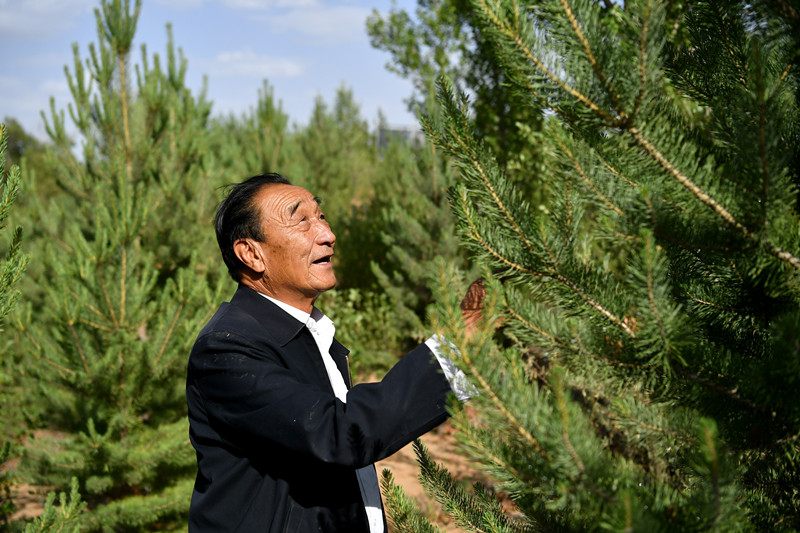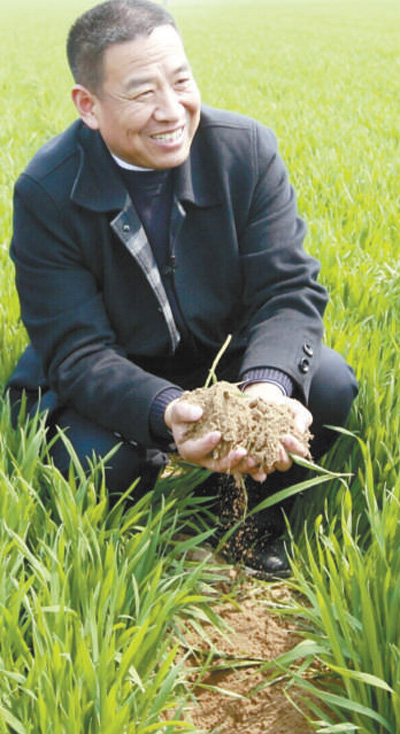The Guardians of the Planet
Sand Tamer

Shi Guangyin, an NPC deputy from Shaanxi Province. Liu Xiao
Shi Guangyin, 69, born in Shaanxi Province, is a pioneer in China's desert control efforts. He has led the way in greening north China by planting tens of millions of different trees and bushes over the past 37 years.
Born into a farmer's family in Dingbian County, Yulin, Shi remembers that as a child, he moved with his family nine times due to the frequent sandstorms, never quite winning the battle. In 1984, the government introduced a policy allowing individuals to manage woods, barren mountains and deserts in order to encourage afforestation and improve the environment. Shi quit his job as head of a farm and contracted 2 square km of the desert with six other households and founded the first farmers' sand control company in China.
From the start, Shi faced a severe fund shortage. In the first year, he had to sell his livestock and take loans from rural credit cooperatives to raise 120,000 yuan ($16,880) to buy saplings. Luckily, there was ample rain that year and 85 percent of the trees he planted survived. But that didn't mean his afforestation efforts were smooth sailing from there. His saplings were then damaged by sandstorms, but he resorted to new planting techniques and ultimately made it work. After three decades of trial and error, the once barren desert has been turned into a forest. Birds, foxes, badgers and pheasants have made their first appearance in the new oasis.
Shi believes that sand control efforts must be combined with efforts to protect clear waters and lush mountains. "The cooperation between businesses and rural households needs to be advanced further and technologies must be adopted to consolidate poverty alleviation achievements. We need high-quality afforestation in the future," he said.
Shi is illiterate. "It would be in vain to fight desertification without knowledge. We need continuous efforts, generation after generation, to protect the environment," he said. So he donated money to build two elementary schools that can accommodate 280 pupils.
In addition to afforestation, Shi's company expanded to other industries such as livestock breeding and potato cultivation to help local people rise out of poverty.
On June 29, Shi received the July 1 Medal, the Communist Party of China's highest honor to a member.
Soil Doctor

Dang Yongfu, a 55-year-old native of Henan Province, has made decades-long efforts to treat soil degradation caused by the overuse of fertilizers and herbicides. This has helped save tens of billions in economic losses for farmers in Henan, Heilongjiang and Jilin provinces, and Inner Mongolia and Xinjiang Uygur autonomous regions, among other provinces in China.
As chief technician with Henan Yuandong Bio-engineering Co., Ltd., Dang was elected a National People's Congress (NPC) deputy in 2018. He was among the NPC deputies who formulated a law that took effect in January 2019. "The purpose of my proposals and suggestions to the NPC sessions is to highlight accurate and legal pollution control to promote the continuous improvement of environmental quality," said Dang, who is also head of the Engineering Technology Center of Cultivated Land Quality Protection in Henan.
China has long faced the problem of fertilizer overuse. "We have more than 40 million tons of chemical fertilizers absorbed into the soil every year, which also pollute bodies of water after permeation," Dang said.
He noted that China cannot secure its food supply without the use of chemical fertilizers and pesticides. However, farmers overuse the chemicals for fear of a drop in production, which on the contrary has led to the decline in the fertility and productive capacity of the soil.
In 2008, Dang developed carbon adsorption polyglutamic acid fertilizer reduction technology. For two consecutive years, farmers in Shufu County in northwest China's Xinjiang applied the technology and achieved an 8.2-percent increase in wheat production, while using 20 percent less fertilizer, according to a local village official.
After years of efforts, more and more farmers have been convinced to reduce fertilizer to protect soil. In May 2020, the Ministry of Agriculture and Rural Affairs adopted Dang's suggestion and issued a chemical fertilizer reduction standard to speed up the quantitative assessment of chemical fertilizers permeated in the soil.
"With living standards constantly improving, the Chinese people should shift the focus from securing enough food to getting healthier food," Dang said. "If I want to eat a healthy diet, I must first treat the farmland well."
Dang suggested during this year's NPC session that farmer's endowment insurance be linked with their grain contribution. "Farmers play an indispensable role in protecting cultivated land. As a result, their contributions should be closely connected to their return," he said.
Industrial Internet+Eco Protection
NPC deputy Liu Huaiping, 40, deputy head of the China Association of Environmental Protection Industry, has been focusing on how the Industrial Internet of Things can empower ecological environmental protection.
"The interoperability of environmental data is not interoperable and isolated islands of information are major problems in current ecological environment management and control," Liu said. He believes that with the help of new-generation information technologies such as big data, cloud computing, 5G, blockchain and artificial intelligence, various resources can be dynamically optimized and integrated, so as to assist in making decision on environmental issues, enhancing comprehensive environmental governance capability and the digital capability of environmental management and control.
"At present, the technology supporting data interconnection and intercommunication is mature, and the government should accelerate the pilot program to promote the investment and construction of the industrial Internet in the field of ecological environment," Liu suggested during this year's Two Sessions.
He also stressed the importance of cultivating high-caliber personnel in environmental enterprises. Currently, many companies have made heavy investment in environmental protection facilities that requires skilled management and operation personnel. But currently, the number of professionals is far from enough.
As the chairman of a technology company on environmental industry, Liu has been promoting environment governance and digital technology. For example, in terms of studying the causes of smog, atmospheric data can be collected through the Internet of Things, so that more accurate data is available for pollution control, while the infrastructure for cloud monitoring of PM2.5 particles could be deployed at a large scale.
Liu also believes that innovation is key to China's environmental protection industries, and the government and business circles should enhance cooperation in this regard. "I'm glad to see that the government has already made major gestures in supporting green finance, energy conservation and environmental protection industries, clean production industries and clean energy industries," he said.
Specializing in building materials and machinery, Liu has participated in several national environmental protection projects and owns more than 10 invention patents. He led his team in breakthroughs on developing ultra-low emission technologies in building materials and machinery. The environmental protection equipment they developed was well received in the market.
Voice of the people
NPC deputies, or lawmakers, are elected by people's congresses in the provinces, autonomous regions and municipalities under the direct jurisdiction of the Central Government. The election of deputies from Hong Kong and Macao special administrative regions and Taiwan follow separate rules. The armed forces select their own deputies.
The deputies submit motions and suggestions at the annual NPC session covering a wide gamut of topics, from science and technological development to education, public health and social affairs. Subsequently, new policies are issued incorporating many of their inputs.
Strengthening environmental protection has been a focus of many deputies like Shi, Dang and Liu. It is also among the key points of the 14th Five-Year Plan (2021-25) for National Economic and Social Development and the Long-Range Objectives Through the Year 2035, as China drives the way forward in building an ecologically friendly society.
"I am an ordinary member of society. I pay attention to the people's hardships, analyze the causes of these problems and make people's voices heard," said Han Deyun, a lawyer and NPC deputy from southwest China's Chongqing Municipality.
Han made a suggestion during this year's NPC session on improving the urban living environment. He pointed out that the direct light from LED screens on buildings with promotional banners can cause serious light pollution, thus must be reduced.
Wang Zhenli, a lawyer and NPC deputy from Guangxi Zhuang Autonomous Region, suggested that the hot tourist destination Guilin in Guangxi should continue to speed up the legislation of ecological and environmental protection to preserve its landscape. In the meantime, historical and cultural protection should not be ignored.
According to official data, the Ministry of Ecological Environment adopted approximately 150 suggestions from NPC deputies in 2020, resulting in the introduction of nearly 60 policy measures.
Since the NPC deputy position is part-time, the law requires deputies to attend training programs and take part in inspections of law enforcement and surveys on important or urgent issues. They are also invited to observe bi-monthly legislative sessions of the NPC Standing Committee.
For instance, in July, an inspection group, including several NPC deputies, went to Sanya in Hainan Province to conduct a special research and inspection on local implementation of the Law on the Prevention and Control of Environmental Pollution by Solid Wastes, which was recently revised in 2020. While commenting on the achievements of the tourist city's law enforcement, the group also offered specific suggestions on kitchen waste disposal at restaurants and the eco-friendly cleaning of sheets at hotels.
- Top legislature schedules standing committee session for late February
- China's top legislator meets with Uruguayan president
- Senior legislator surveys Anhui on formulating outline of provincial 15th Five-Year Plan
- China's top legislator meets with British PM
- NPC deputies see more engagement with top court



